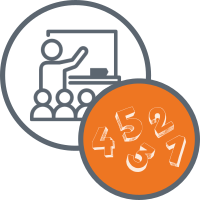CDE will be closed on Monday, Jan. 20 for the Martin Luther King, Jr. holiday.
You are here
Equity-Based Mathematics Teaching Practice 2: Leveraging Multiple Mathematical Competencies
Instructional Support Menu
Leveraging Multiple Mathematical Competencies
Leveraging multiple mathematical competencies is an equity-based teaching practice that requires effort both in instructional policy and practice. On the policy side, teachers and schools must work to resist efforts to track students by ability, whether that be broad, multi-course tracks for so-called “high” and “low” students, or within-class tracking in which students are placed in groups by ability (NCTM, 2018). On the practice side, the selection of high-quality tasks is again key. While some teachers may assume that struggling students would struggle most with tasks requiring high cognitive demand, they may be surprised to find that such tasks--which distinguish themselves because no prescribed procedure or strategy is provided--actually give struggling students opportunities to creatively leverage their skills and knowledge as they engage with the problem.
The Practice in Action
Aguirre, Mayfield-Ingram, and Martin (2013, pp. 43-48) summarize the practice of going deep with mathematics by describing what it does and doesn't look like in a lesson, considerations for assessment, and questions for teacher reflection.
Caution! Don't over-estimate your own understanding based on these brief descriptions of teaching practice. Professional educators should dig more deeply into related resources, join study groups and professional networks, and seek out professional development and coaching to ensure high-quality engagement in the practice.
A representative lesson
- Structures student collaboration to use varying math knowledge and skills to solve complex problems.
- Presents tasks that offer multiple entry points, allowing students with varying skills, knowledge, and levels of confidence to engage with the problem and make valuable contributions.
A non-representative lesson
- Promotes individual progress at specific, predetermined levels of ability.
- Often structures group work by ability.
- Presents tasks that are rigid and highly sequenced.
- Requires students to show mastery of skills prior to engaging in more complex problem solving.
Assessment considerations
Assessing a task:
- Calls for a diversified rubric and an answer key that includes math practices such as examining patterns, generalizing, abstracting, making comparisons, and specifying conditions.
- Requires looking for multiple ways that students demonstrate their knowledge, such as through the use of language, gestures, pictures, physical models, and concrete objects.
Questions for reflection
- How do I identify and support mathematical contributions from students with different strengths and levels of confidence?
Resources
- The Impact of Identity in K-8 Mathematics: Rethinking Equity-Based Practices by Aguirre, Mayfield-Ingram, & Martin (2013)
- Catalyzing Change in High School Mathematics: Initiating Critical Conversations by NCTM (2018)




Connect With Us





